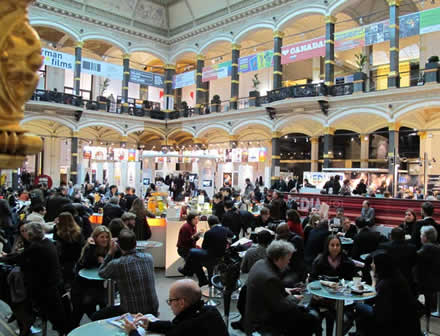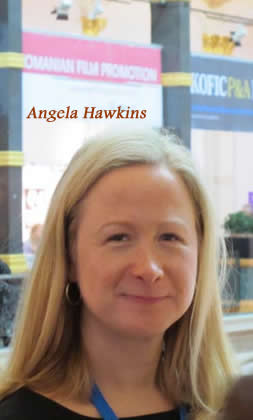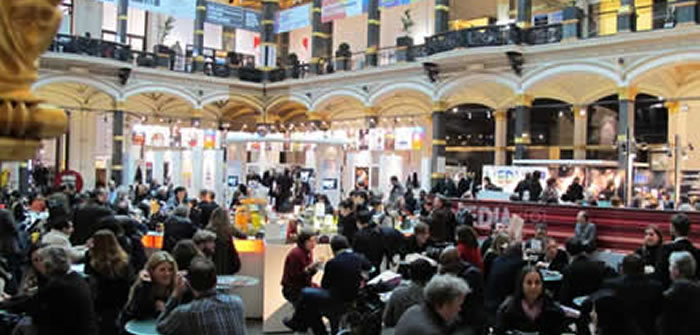Germany may have lost its bid for best foreign language film at the Oscars this year (though The White Ribbon did conquer that category at the Golden Globes), but on their home turf, German films seem to be winning all kinds of attention.
At the recently wrapped Berlin International Film Festival, for example, German entries were front and center once again, nabbing no less than 7 of the festival’s 26 competition slots thanks largely to the programming moxie of Dieter Kosslick, the Barnum & Bailey-inspired film promoter and artistic director of the festival for the past nine years.
“It has become a tradition of ours to put German films back in the program,” he told Reuters recently. “It was a bit audacious at first, but it’s no big deal anymore.”
Big deal or no, the art of the deal was clearly the point when one thinks of the many international co-productions that were shot or funded (or both) in Germany last year. Which, I discovered, was precisely what American-born but Germany-residing Angela Hawkins was thinking when CWB’s Tanja Meding and I, armed with our impossibly small Flip HD camera, ran into her at Berlin’s European Film Market a couple of weeks ago. (See accompanying video)
As avid watchers of this website will know, Angela makes her annual appearance here on our viewers’ laptops/iPhones/iPads/Blackberries during the Berlinale, doling out parcels of market wit and wisdom as she purveys the German film scene from her perch at the German Films stand in the Market’s Martin Gropius Bau.
And once again, Tanja and I were clued in to the State of the Marketplace by observing Angela’s exquisite, prophetic sense of fashion awareness. There she was, garbed in a black dress and black shoes (sure signs of the ever-darkening sales slouch confronting the global film industry), yet happily sporting an impressive gold ring — an equally sure sign of the resilient box office and gleaming critical acclaim that has accessorized the German film business of late.
Angela nodded in affirmation of our sartorial analysis, then added as she flashed her large gold finger-wrapper: “Well, you have to invest in something these days.”
Clearly, we noted, the German marketplace had been investing rather aggressively in German movies.
“Yes, in the home market we had another record year for admissions,” she concurred. “Of course, as with every foreign language film, it’s difficult making sales abroad. But German film sales have been on a high for the last couple of years.”
And that’s not to mention all the international co-productions that were funded by and/or filmed in Germany this year.
As if counting pearls on an invisible necklace of movie offerings, Angela threaded her way through some notable examples of such co-productions: Roman Polanski’s The Ghost Writer, shot in Berlin and in Potsdam’s Babelsberg Studio; Quentin Tarantino’s Inglorious Bastards (which nabbed an Oscar for Austrian Christoph Waltz), shot entirely in Berlin and Babelsberg; The White Ribbon, of  course; and one of our personal favorites, Michael Hoffman’s Oscar-nominated The Last Station, also shot in Germany with German funding,
course; and one of our personal favorites, Michael Hoffman’s Oscar-nominated The Last Station, also shot in Germany with German funding,
“People don’t really realize these were made here in Germany,” Angela emphasized. “It’s not just the (investment) money. It’s the fact that they employ film pre-production, production and post-production people, along with providing all the catering and hotel rooms. It’s a great economic generator for the German film landscape.”
Before we headed off to our belated lunch, we reminded Angela of the wintery landscape and lousy weather lurking just outside the Market’s doors. Might it inspire any apt metaphors for the current economic woes besetting so many of the 419 companies attending this year’s Market?
“Well, it’s slippery out there,” Angela offered, her gleaming ring suddenly disappearing behind the bundle of promotional pamphlets she was toting. “You gotta watch where you’re stepping whenever you buy. You could land in a big puddle – or worse – if you’re not careful.”
Like Kosslick, Angela herself as a bit of the Barnum & Bailey promoter in her, and so she added: “There’s a saying in German, ‘Die Hoffnung stirbt zu letzt,‘ which means hope dies last. I think people here are used to the bad news and are aiming for better times ahead. You gotta have hope.
We thanked Angela for her time and wisdom, then proceeded to aim ourselves toward the Market’s coat check for our overcoats and galoshes, followed, it was to be hoped, by a nice warm lunch.

